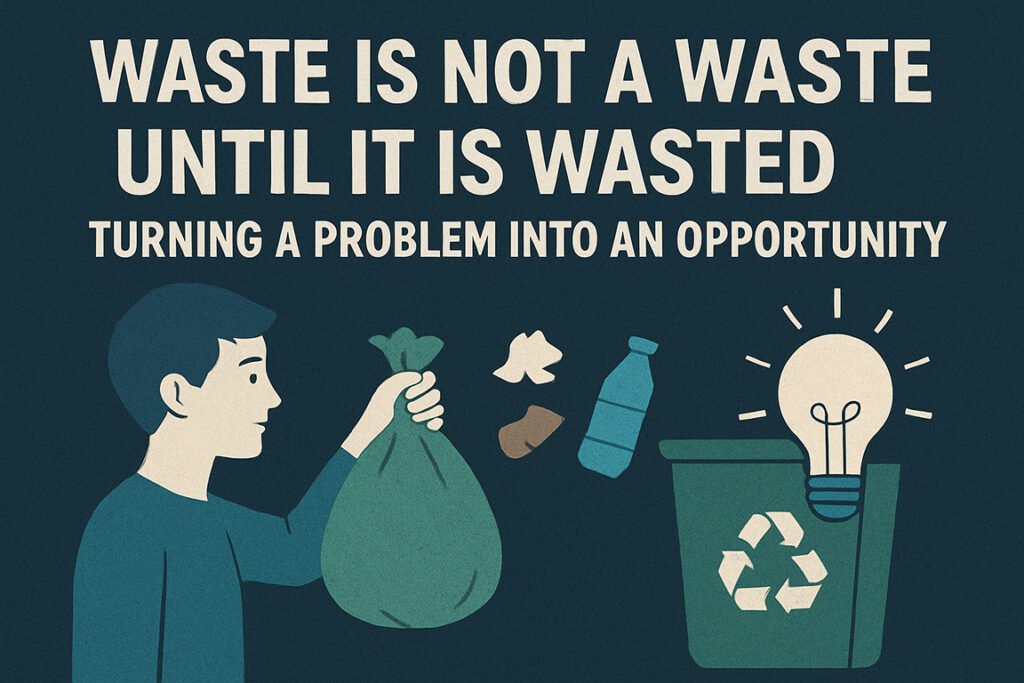
Waste is not a waste until it is wasted-Turning a problem into an opportunity
Waste is not wasted until it is wasted – this powerful adage serves as the guiding principle for a zero-carbon lifestyle practiced by all successful cities in the world and the evolution of the circular economy. As an outsider to Andhra Pradesh, I’m consistently struck by the apparent disregard many residents show for keeping their surroundings clean. It’s a disheartening observation.
Take, for instance, the affluent LIC Colony in Vijayawada where I live. Every morning, the dedicated staff of the Vijayawada Municipal Corporation (VMC) diligently collect trash from homes and meticulously clean the streets. Yet, by nightfall, a disheartening sight emerges: most of the resident’s water clean their house front yard and draw Rangoli. But just before this cultural welcoming of deity, they dump all waste including kitchen waste over the street, yards away from their clean home. These wastes are then scattered by foraging street dogs. The sincere efforts of the VMC staff, who work tirelessly to maintain cleanliness, are undermined daily. This raises a crucial question: Whose responsibility is this?
I keep my kitchen waste (biodegradable) and plastic waste separate and hand it over to VMC workers every morning. But the truth, as soon as they collect the separated waste, they dump it together into their truck, making it impossible to separate degradable and non-degradable for recycling. Over and over, when I ask them to keep it separate, they comment what will we do at the end of the day. We can dump it together only, showing the inability of the authorities to provide a waste management solution.
It’s clear that a fundamental shift in behavior is desperately needed, not just in LIC Colony, but across all of Andhra Pradesh with the public and the responsible local bodies. We aren’t lacking in environmental laws. Rather, the issue lies in their inadequate implementation and enforcement.
Recent news, however, offers a glimmer of hope. It was encouraging to read about Chief Minister Chandrababu Naidu’s visit to a waste processing unit run by Jindal. Then the 300-acre Circular Economy Industrial Park at Thukivakam near Tirupati. Furthermore, the government’s recent ban on plastic covers across the state is a commendable step. While these initiatives are positive, it’s important to acknowledge the scale of the challenge. The amount of waste generated in Andhra Pradesh is at least 98% more than what the Jindal plant can convert into energy, highlighting the immense task ahead. The Circular Economy Industrial Park is the solution to processing the huge reservoir of plastics produced in a day to recycling and value-added product manufacturing like the Plastwood, the alternative for wood and many other value added products.
The adage “Waste is not wasted until it is wasted” holds profound resonance in the context of Andhra’s swelling urban population and its escalating waste crisis. While seemingly paradoxical, it underscores a crucial truth: every discarded item, regardless of its initial perceived worthlessness, retains potential value until it is irrecoverably lost through irresponsible disposal. India’s rapid urbanization has unfortunately been accompanied by a pervasive “trashing culture” that overlooks this inherent value, leading to severe environmental degradation and public health hazards.
The core problem lies not just in the quantity of waste, but in the pervasive “trashing culture” that permeates many urban landscapes. It is not that different in Andhra villages too.
A fundamental pillar of effective waste management is segregation at the source (households, offices, commercial establishments). In India, despite rules mandating it, the practice remains largely inconsistent. Mixed waste streams, where wet and dry, recyclable and non-recyclable materials are haphazardly combined, make efficient processing and recycling almost impossible. This “trashing” of mixed waste immediately reduces its potential value, effectively “wasting” it before it even leaves the doorstep.
initiatives like the Swachh Bharat Mission (SBM) have raised awareness about cleanliness, a deep-seated behavioral change regarding waste disposal is still evolving. Insufficient public participation in segregation and a lack of stringent enforcement of waste management rules contribute significantly to the irresponsible trashing culture.
More than enforcement, the government should wake up and start setting up waste management units than allocating waste dumping yards. Recent fire in God’s Own Country Kerala’s Bhramapuram Waste Treatment plant, which become a dump yard due to improper planning and corruption is a classic wakeup call on how many governments take this critical matter lightly and create land, air and water pollute.